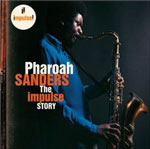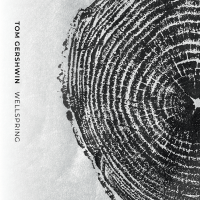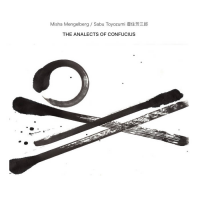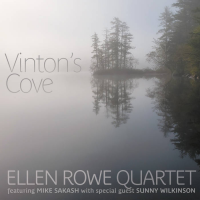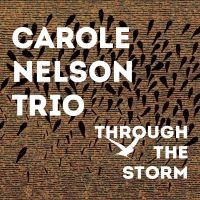Home » Jazz Articles » Album Review » Pharoah Sanders: Pharoah Sanders: The Impulse Story
Pharoah Sanders: Pharoah Sanders: The Impulse Story
In 1965, John Coltrane began regularly calling on Sanders to augment his late-period outer-reaches band. Sanders is one of the saxophonists frightening the horses on Ascension, Live In Seattle and Meditations (recorded in 1965) and Live At The Village Vanguard Again! (1966). He's also heard (though poorly, due to the sound quality) on The Olatunji Concert: The Last Live Recording (1967).
But all this while, Sanders was developing his own, more conventionally lyrical, world music-drenched—and, frankly, caned and out of its tree—take on the new wave, sometimes leading his own band, sometimes playing with pianist/harpist Alice Coltrane. After John Coltrane's death in 1967, Sanders and Alice Coltrane continued to follow their tripped-out modal path, creating something which—for want of a better phrase—could be called astral jazz.
Sanders' astral jazz retained his signature sound from the John Coltrane band—harmonics, multiphonics, vocalisations, giddy leaps in pitch—and applied them to a more mellifluous, vamp and ostinato-driven style packed with African and South Asian percussion instruments, world rhythms, bells... and a lot of incense.
In 1966, Impulse! producer/A&R man Bob Thiele offered Sanders his own contract, and a river of outstanding music began to flow. The first album, Tauhid, is probably the finest Sanders/Thiele collaboration, and its mesmeric, slow-burning sixteen-minute opener, "Upper Egypt And Lower Egypt," begins this compilation. Guitarist Sonny Sharrock is memorably featured up front. "The Creator Has A Master Plan," from 1969's Karma, follows in all its blissed-out 33 minutes of glory.
Pharoah Sanders: The Impulse Story is one of ten single-CD artist samplers released as part of the The House That Trane Built project. Ashley Kahn, the compiler of this album—and the overall box set and book project—was never going to keep everyone happy. I'd have found room on this album for the berserk drums and whistles romp of "High Life," from 1972's Wisdom Through Music, even if meant dropping "Astral Travelling" (from 1970's underwhelming Thembi). But the closer here, "Spiritual Blessing," from 1973's Elevation, with its concord of harmonium, tamboura and bell tree, deserves inclusion.
Track Listing
Upper Egypt And Lower Egypt; The Creator Has A Master Plan; Astral Travelling; Spiritual Blessing.
Personnel
Pharoah Sanders
saxophone, tenorPharoah Sanders: tenor saxophone (1,2), soprano saxophone (3,4), piccolo (1), vocal (1), percussion (1,3); Dave Burrell: piano (1); Sonny Sharrock: electric guitar (1); Henry Grimes: bass (1); Nat Bettis: percussion (1,2); Roger Blank: drums (1); Julius Watkins: French horn (2); James Spaulding: flute (2); Lonnie Liston Smith: piano (2), electric piano (3); Richard Davis: bass (2); Reggie Workman: bass (2); Billy Hart: drums (2); Leon Thomas: vocal and percussion (2); Michael White: violin (3); Cecil McBee: bass (3); Clifford Jarvis: drums (3); Joe Bonner: harmonium (4); Calvin Hill: tamboura (4); Lawrence Killian: bell tree (4); John Blue and Jimmy Hopps: percussion (4); Michael Carvin: drums (4).
Album information
Title: Pharoah Sanders: The Impulse Story | Year Released: 2006 | Record Label: Impulse!
Tags
PREVIOUS / NEXT
Support All About Jazz
 All About Jazz has been a pillar of jazz since 1995, championing it as an art form and, more importantly, supporting the musicians who make it. Our enduring commitment has made "AAJ" one of the most culturally important websites of its kind, read by hundreds of thousands of fans, musicians and industry figures every month.
All About Jazz has been a pillar of jazz since 1995, championing it as an art form and, more importantly, supporting the musicians who make it. Our enduring commitment has made "AAJ" one of the most culturally important websites of its kind, read by hundreds of thousands of fans, musicians and industry figures every month.


